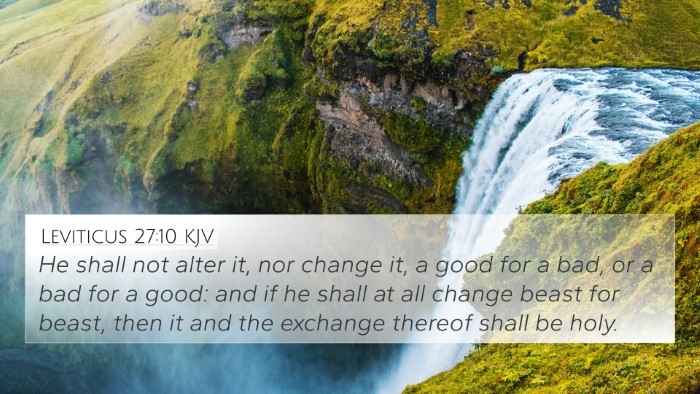Understanding Leviticus 27:33
Leviticus 27:33 states:
"And if he will at all redeem it, then he shall add a fifth part thereof unto thy estimation."
This verse is part of the regulations that dictate the value of things dedicated to God and how they can be redeemed.
The essence of this declaration lies in the principle of proper estimation and the integrity demanded in transactions related to sacred offerings. The commentary from Matthew Henry highlights that this reflects God's ownership of all creation and His right to dictate terms regarding sacred matters.
Albert Barnes offers insights into the cultural context of redemption practices. In ancient Israel, redemption often involved certain conditions, emphasizing the seriousness of dedicating something to God, and the need for compensating the original value by a fifth part to acknowledge its sacred significance.
Adam Clarke notes that this requirement not only affirms the seriousness of vows or dedications made to God but also serves as a protective measure to ensure that the dedicated property remains with the temple or the community. The added fifth part acts as an encouragement to avoid casual vows, thereby fostering devotion.
Bible Cross-References for Leviticus 27:33
To deepen the understanding of this verse, several related scriptures can be considered:
- Exodus 30:12: Speaking about ransom for souls, it deals with the concept of value and redemption.
- Numbers 18:15-16: Discusses the redemption of firstborns and the obligation that comes with them.
- Galatians 3:13: Touches on the concept of being redeemed from the curse of the law.
- Matthew 5:23-24: Advises reconciliation before offering to God, underscoring the seriousness of commitments.
- Acts 20:28: Points to the concept of the church being acquired with the precious blood of Christ, affirming the value of dedicated offerings.
- Mark 7:11: Discusses the traditions concerning vows and dedicating property to God, highlighting community practices in understanding dedications.
- Romans 12:1: Encourages believers to present their bodies as living sacrifices, which correlates with the sacrificial theme in Leviticus.
- Hebrews 9:22: Notes that, without the shedding of blood, there is no remission, clarifying the seriousness of atonement and sacrifice.
- 1 Corinthians 6:20: Affirms the idea that believers are not their own but have been bought with a price, connecting to the concept of belonging and redemption.
- 2 Corinthians 5:17: Emphasizes the idea of new life in Christ, signifying renewal and transformation, paralleling the theme of returning value in Leviticus 27:33.
Connections Between Bible Verses
The importance of redemption and value in both the Old and New Testaments illustrates a comprehensive biblical theology that values life dedicated to God. For instance, the cross-reference Bible study of Leviticus 27:33 with Galatians 3:13 draws a significant connection, emphasizing that just as the Israelites added value to what they dedicated, Christ added immeasurable worth to our lives through redemption.
Furthermore, the study of these connections can elucidate the gradient of God’s expectations across covenants. By employing tools for Bible cross-referencing, readers can discern how early laws in Leviticus shape the understanding of grace provided in the New Testament.
Tools for Cross-Referencing
Utilizing a Bible concordance can facilitate greater understanding of how themes develop throughout scripture. Consider this verse in the context of the Bible reference resources available, such as study Bibles and academic commentaries, which provide profound insights into thematic Bible verse connections across the canon.
Conclusion
In summary, Leviticus 27:33 invites readers to recognize not only the ancient practices of redemption but also its profound implications in Christian theology today. The generational ties highlighted through scriptural cross-referencing create a rich tapestry of learning and reflection on the nature of God's demands, the seriousness of our commitments, and the overwhelming grace we have received.
As you engage in cross-reference Bible study, remember how each scripture holds conversations with others, leading to a deeper understanding of God's Word and the narrative of redemption that defines the biblical story.



